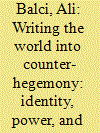| Srl | Item |
| 1 |
ID:
190423


|
|
|
|
|
| Summary/Abstract |
This article investigates the Chinese party-state’s hegemonic project to construct social consent in NGOs and how they react to this. Using service-oriented NGOs as examples, it argues that the changing institutional dynamics of NGO governance in China demonstrates that Chinese civil society is a site of ideological struggle. The party-state has adapted some foreign concepts and practices of civil society, which have been popular in China since the reform era, to serve its political and socioeconomic agenda, while avoiding political challenges of liberal values and discourse. Civil society’s hegemonic transformation relies on two major mechanisms—professionalization and Maoist incorporation. This process, however, also leaves some space for NGOs to act differently. Some have been comfortably incorporated into the state-led welfare system and reproduce authoritarian norms and practices among their beneficiaries, whereas counter-hegemonic activism still exists among groups that link their stance and agenda closely with marginalized groups in society.
|
|
|
|
|
|
|
|
|
|
|
|
|
|
|
|
| 2 |
ID:
157108


|
|
|
|
|
| Summary/Abstract |
This article is an attempt to develop a theoretical framework about how to study dissident ethnic movements’ foreign policies. Is it possible to speak about foreign policies of ethnic dissident movements, especially when it is considered that they have no characteristics of modern sovereignty such as territory and recognition? For example, do the Berbers in Morocco, the Catalans in Spain, the Balochs in Iran, and the Kurds in Turkey have a foreign policy? If they do, how do we study their policies toward the outside world? Specifically, focusing on the case of the Kurds in Turkey, this article attempts to provide a theoretical framework for how to study dissident ethnic movements’ foreign policy performances. By looking at the effect of the end of the Cold War on the Kurdish nationalists’ imagination of the United States, this article interrogates how the change in their imagination played a role in the construction and reconstruction of the post-1980 Kurdish identity in Turkey. It also draws on the work of poststructural and postcolonial Ernesto Laclau, David Campell, and Edward W. Said in order to develop the theoretical framework.
|
|
|
|
|
|
|
|
|
|
|
|
|
|
|
|